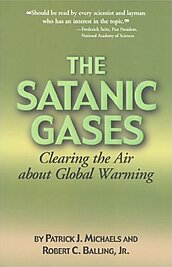Global warming is vastly overrated as an environmental threat, argue leading climatologists Patrick J. Michaels and Robert Balling, Jr. Former Vice President Gore staked much of his career on a largely mythical problem, they write.
The Satanic Gases marshals an impressive array of scientific data, studies, and analyses that argue, cogently and consistently, that the initial forecasts of rapid global warming were simply wrong. But, perhaps more important, the book points out that attempts to “fix” the forecast by the UN’s Intergovernmental Panel on Climate Change are even more misguided than the original projections.
The authors argue that the jury is already in on global warming, and the verdict is a modest heating over the 21st century—very similar to what occurred during the last third of the 20th century. The vast majority of warming will take place in the winter, and within that season, the coldest, deadliest air masses will show the greatest change. The final third of the last century saw the greatest improvements in food supply, wealth, and longevity of life ever experienced. Some improvements actually resulted from changes in the earth’s natural greenhouse effect and others were totally insensitive to temperature. The authors argue that it is virtually impossible to reverse all of that progress with only a continued slow warming of the planet.
Unlike every other book on global warming, The Satanic Gases places the issue in its proper social and scientific context. Citing the pioneering work of historian of science Thomas Kuhn and economist James Buchanan, Michaels and Balling demonstrate that it was inevitable that global warming would be distorted by the political sphere and that most scientists would either stand mute or actually assist in that process. But, the authors argue, such distortions in science are always temporary, and inevitably the scientific community will concede that earlier forecasts dramatically exaggerated the threat of global warming.
